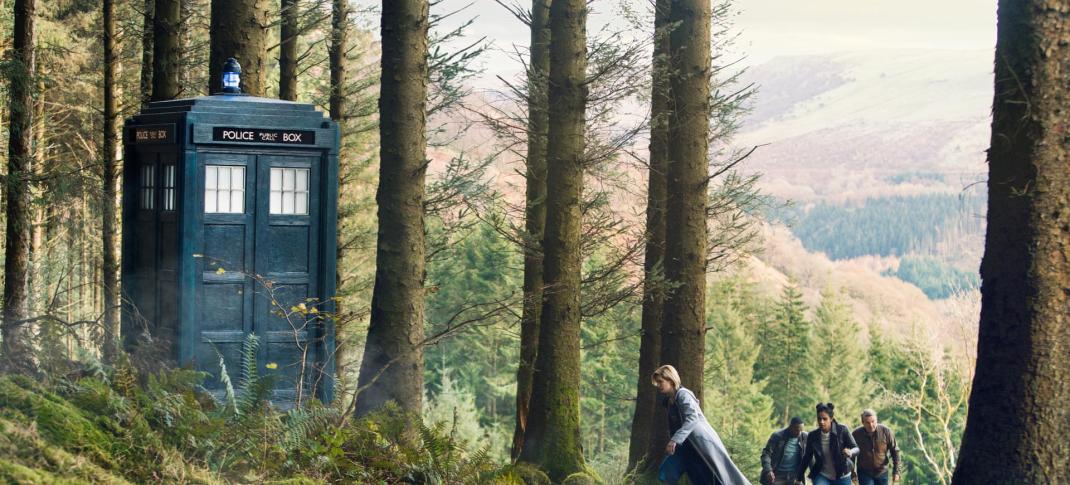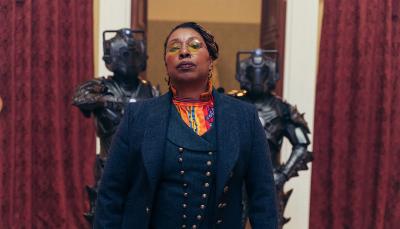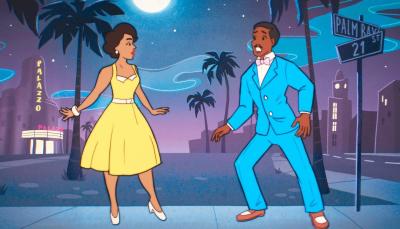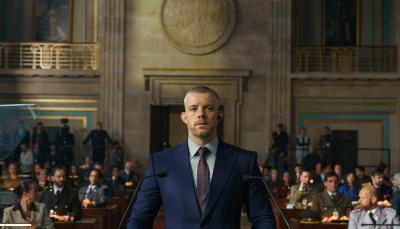'Doctor Who' Season 11, Episode 9 Recap: "It Takes You Away"

Doctor Who arrives in present-day Norway for one of the most brilliantly creepy episodes of the season.
The Doctor: The Woolly Rebellion. In 193 years, there's a total renegotiation of the Sheep/Human relationship. Utter bloodbath.
Once upon a time, before there was time, all the parts of the universe were there. But they couldn't assemble because there was also a consciousness. Called "the Solitract" by the Doctor's Fifth Granny (she apparently had seven), this mythical creature, a universe-sized conciousness, is described as a disease. A better way of explaining it is a being with a psyche massive enough to hold the pieces of the universe apart. Once it was removed from our universe to its own plane, the molecules came together, matter joined with energy and the world as we know it was born.
It's this Timelord myth, this idea of a universal-sized entity, utterly alone, unable to be part of our universe, floating along beside us in "The Solitract Plane," that formed the basis of season 11's penultimate episode.

The story begins as a bit of Scandinavian noir, not unlike Netflix's recent series The Rain. Team Upon landing in Norway, TARDIS, discovered a boarded-up house with a terrified little girl inside. Hanne (Eleanor Wallwork) is blind and alone. Her father, Erik (Christian Rubeck), went out one day and never came back. Her mother Trine has been dead for months, Erik moved them out here after her death because he needed to get away from the memories. Hanne believes her father was abducted by a monster in the woods. She waits at the house for his eventual return, boarded up in fear every time she hears the monster roar, not long before sundown.
But while the terror noises may be coming from outside the house, it's inside where the Doctor discovers that things are terribly wrong. There's a mirror into a alien, cavelike system, and a portal to another universe, inside Erik's bedroom. She, Yaz, and Graham go to explore it, while Ryan is forced to stay behind and look after Hanne, even though she doesn't like him. (He assumed that, just like his own father, Hanne's dad has abandoned her here, an idea that the girl fiercely resents.) But Ryan might be on to something about Erik, as the next time the monster roars, he starts tracing the sound... and realizes it's just a couple of speakers Erik set in the woods, and a timed recording. It's a cruel trick to keep the blind girl inside while Erik is gone, presumably into the mirror.
Graham: Do you think it's safe?
The Doctor: I doubt it. It's a (something) dimensional portal in a mirror in a Norwegian bedroom.
Meanwhile, the Doctor and her pals have wound up in a maze-like system of caves, stuck in the dark with no idea where they are going. Luckily, or perhaps not, they run into a creature who introduces himself as Ribbons of the Seven Stomachs (Kevin Eldon). He explains they are in an "Anti-zone" a place, as the Doctor explains, that acts as a sort of buffer zone when two worlds attempt to touch which aren't supposed to. It's a barrier keeping the real world safe from what should be directly on the other side of the mirror.
Ribbons has a lantern, and also claims to have seen Erik crossing through the Anti-zone, promising to take them to where Erik went for the trade of the Doctor's sonic. He never gets the sonic though, as the group is set upon by gigantic flesh-eating moths, who wind up attacking the greedy Ribbons and leaving him a skeleton.

Turns out the guide wasn't necessary anyway. The Doctor, Graham, and Yaz find the portal on their own, only to realize they've crossed into a new universe. (The camera work here is ingenious, everything in this "mirror world" plays with the shots flipped backward, so the faces all look just a tiny bit off because they're the mirror image of what viewers are used to seeing.) Erik is in this mirror universe too, and it turns out Ryan was more bang on than anyone realized. He abandoned Hanne because here his dead wife, Trine (Lisa Stokke), is still alive and well.
But Trine can't cross back over, and every time Erik thinks about going back for Hanne, she convinces him to wait a little longer. Obviously, it's a trap. And it becomes only more obvious when a suddenly resurrected Grace (Sharon Clark) appears, bound and determined to keep Graham there too.
Yaz: What if we do something it hasn't dealt with before? Like, reverse the polarity or something?
The Doctor: Yes we can! You speak my language!
As I said at the top, this is the myth of the Solitract plane made flesh. It's a conscious universe, attempting to create a world filled with a place and people the humans who cross over won't reject, in a desperate attempt to trick someone to stay. But it's not real. When Hanne arrives, determined to find her father herself, she instantly recognizes the creature he introduces as "her mother" is all wrong and demands her father leave with her at once. When Grace tries to tell Graham he doesn't need to go into the Anti-zone to rescue Ryan, Yaz stands up and insists the real Grace would be the one leading the charge to save her grandson. One by one the humans from the real world reject the Solitract and are ejected until only the Doctor is left.
The Doctor might have been able to be the Solitract's friend, perhaps, if the universe was different. But it's not. As much as the Doctor would love to live in a world where her BFF is a universe-sized being, and show this creature all the beauty of the stars and time, she's too much for the Solitract Plane to handle. The Solitract must let her go.
It's a bittersweet parable about letting go of the past for humanity and moving on to the future, to stay alive and with the ones who still love and need you, instead of abandoning them to live in the shadow of a memory. Though this season has been excellent when it comes to history, and fun present-day political allegories, it's this sort of grand concept science fiction which has always been the heart of Doctor Who.




